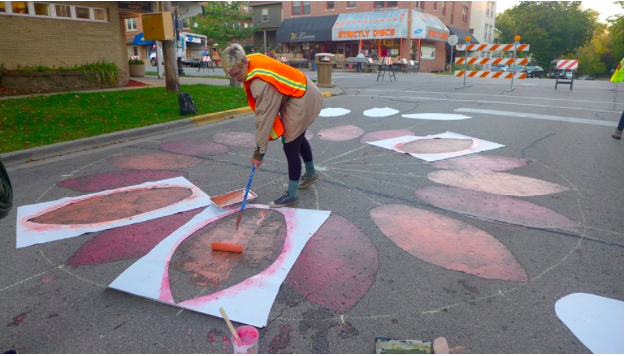






 (photo credit: Greening Monroe Street Facebook page)
(photo credit: Greening Monroe Street Facebook page)
In an attempt to “green” Monroe Street, reconstruction plans extend beyond concrete slabs. Drafted plans for the 2018 street construction emphasize creating a more environmentally and pedestrian-friendly neighborhood.
“It’s pretty remarkable because it’s the first time in Madison that a street reconstruction is more than tearing up the street and replacing the utilities and pavement,” said Jim Lorman, director of Edgewood College’s Sustainability Leadership Program. “It’s looking at it as a public space that contributes to the vibrancy and livability of the community.”
According to Lorman, street reconstruction typically revolves around “grey infrastructure” such as pipes and sewer systems. The Monroe Street reconstruction plan considers additional elements such as ways to increase access to nature and to improve water management, pedestrian safety and public engagement.
Rain gardens are one element of the projected plan. Consisting of grass-like or native prairie plants, the gardens allow water infiltration deep into the ground. While aesthetically pleasing, the gardens also limit flooding and add to ground water supply.
The current water management system operates with sewers that drain water directly into the lakes. This type of system does not filter out unwanted potential contaminants, such as oils, leads, fertilizers and pesticides, so it contributes to lake pollution. Rain gardens will ameliorate these effects by absorbing more storm water and encouraging the biofiltration of pollutants.
District 13 Alder Sara Eskrich explained that this reconstruction project will invest tax-payer dollars in long-term projects. The money will build a better road, accommodate street users in safer ways and contribute to a more sustainable community. While most construction projects fail to consider multipurpose benefits, the Monroe Street reconstruction project has potential to help combat problems such as global warming and climate change, according to Eskrich.
The planning process also differs from traditional approaches because it places a high value on public involvement. Headed by the Edgewood College Sustainability Leadership Program, Friends of Lake Wingra and the Dugeon-Monroe Neighborhood Association, all opinions are welcomed. In fact, they are encouraged.
“We want to make sure that people who should have a voice in the planning actually do have a voice,” Lorman said.
City staff and officials, Monroe Street residents and other community members, engineers, landscape architects, neighborhood organizations and other groups, including Bike Madison, the Wisconsin Environmental Initiative and the Monroe Street Merchants Association are all involved in planning the street reconstruction, along with many others.
Working from the ground up, the plans will consider the community’s needs in a new, innovative way. The planning committee recently hired a consultant to help organize ideas and to facilitate the planning process over the next year and a half. A steering committee is also in progress, which will hold the city accountable to the public’s decisions.
“Nothing is going to get better if we do them the way they’ve always been done,” Eskrich said.
|
|
|
Welcome to the Madison Commons, a website designed to provide news and information about all of Madison's neighborhoods and a crossroads for the discussion of community issues. The name comes from the idea of a village commons, a place for news, talk, debate, and some entertainment, too, that's open to everyone.
All rights reserved. Read more about the Madison Commons and its partners.

